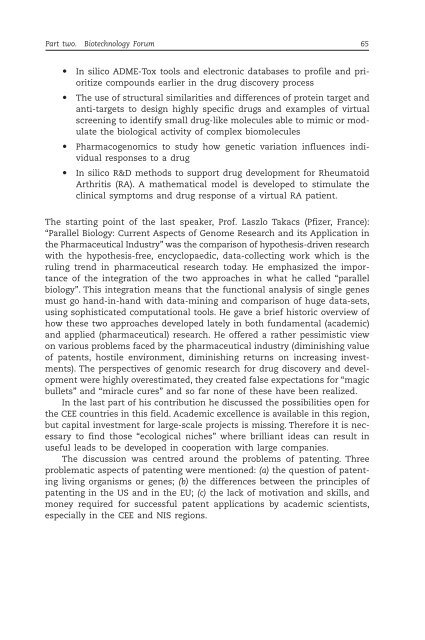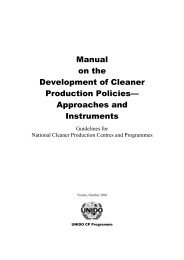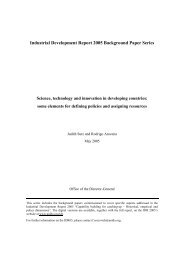TECHNOLOGY FORESIGHT SUMMIT - Unido
TECHNOLOGY FORESIGHT SUMMIT - Unido
TECHNOLOGY FORESIGHT SUMMIT - Unido
You also want an ePaper? Increase the reach of your titles
YUMPU automatically turns print PDFs into web optimized ePapers that Google loves.
Part two. Biotechnology Forum 65<br />
<br />
<br />
<br />
<br />
In silico ADME-Tox tools and electronic databases to profile and prioritize<br />
compounds earlier in the drug discovery process<br />
The use of structural similarities and differences of protein target and<br />
anti-targets to design highly specific drugs and examples of virtual<br />
screening to identify small drug-like molecules able to mimic or modulate<br />
the biological activity of complex biomolecules<br />
Pharmacogenomics to study how genetic variation influences individual<br />
responses to a drug<br />
In silico R&D methods to support drug development for Rheumatoid<br />
Arthritis (RA). A mathematical model is developed to stimulate the<br />
clinical symptoms and drug response of a virtual RA patient.<br />
The starting point of the last speaker, Prof. Laszlo Takacs (Pfizer, France):<br />
“Parallel Biology: Current Aspects of Genome Research and its Application in<br />
the Pharmaceutical Industry” was the comparison of hypothesis-driven research<br />
with the hypothesis-free, encyclopaedic, data-collecting work which is the<br />
ruling trend in pharmaceutical research today. He emphasized the importance<br />
of the integration of the two approaches in what he called “parallel<br />
biology”. This integration means that the functional analysis of single genes<br />
must go hand-in-hand with data-mining and comparison of huge data-sets,<br />
using sophisticated computational tools. He gave a brief historic overview of<br />
how these two approaches developed lately in both fundamental (academic)<br />
and applied (pharmaceutical) research. He offered a rather pessimistic view<br />
on various problems faced by the pharmaceutical industry (diminishing value<br />
of patents, hostile environment, diminishing returns on increasing investments).<br />
The perspectives of genomic research for drug discovery and development<br />
were highly overestimated, they created false expectations for “magic<br />
bullets” and “miracle cures” and so far none of these have been realized.<br />
In the last part of his contribution he discussed the possibilities open for<br />
the CEE countries in this field. Academic excellence is available in this region,<br />
but capital investment for large-scale projects is missing. Therefore it is necessary<br />
to find those “ecological niches” where brilliant ideas can result in<br />
useful leads to be developed in cooperation with large companies.<br />
The discussion was centred around the problems of patenting. Three<br />
problematic aspects of patenting were mentioned: (a) the question of patenting<br />
living organisms or genes; (b) the differences between the principles of<br />
patenting in the US and in the EU; (c) the lack of motivation and skills, and<br />
money required for successful patent applications by academic scientists,<br />
especially in the CEE and NIS regions.

















